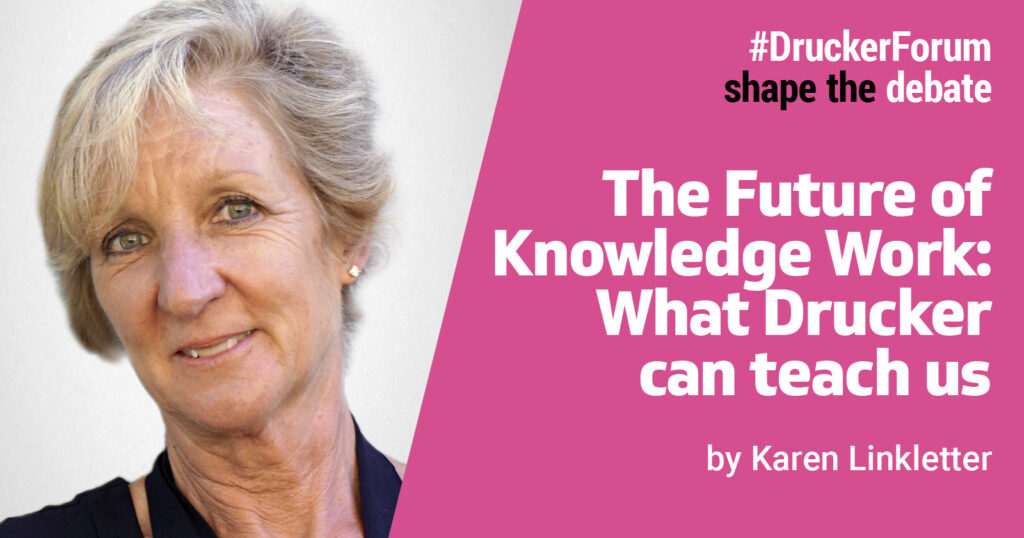
As we consider the concept of knowledge work today, we are faced with several challenges. How do we motivate increasingly independent workers to be part of an organization or a team? How do we measure and evaluate knowledge worker productivity? How do knowledge workers face the ever-changing landscape of AI and associated technologies? Although he has been gone for almost 20 years, Peter Drucker identified the shift towards knowledge work, and left us some very sound advice for navigating the rough waters we now confront.
Peter Drucker used the term “knowledge work” to describe the shift in the American economy from industrial manufacturing to service sector organizations. In America’s industrial society of the first half of the 20th century, technological advances were driven by the needs of production. Knowledge was applied to work. By the end of the twentieth century, the nature of work had changed. Manufacturing employment was declining, and Drucker’s “knowledge work” was ascending. People were using their education and minds, not just their bodies, to produce. This resulted in a shift from applying knowledge to work to applying knowledge to knowledge. The new knowledge workers were no longer employees needing direct supervision. Instead, they were independent, possessing specialized knowledge in areas outside of management’s expertise. Knowledge work was self-contained and portable.
Drucker recognized that knowledge worker motivation and productivity were the primary challenges facing us in the 21st century. Workers in many ways are even more independent than in Drucker’s era, as they possess technologies and skills that allow them to work almost anywhere and collaborate with others outside a centralized workspace. In many cases, contemporary knowledge workers no longer need access to organizations to be effective; the portability of Drucker’s knowledge worker (in the form of changing jobs) has morphed into the entrepreneur who can run her own business as a consultant.
How do we motivate knowledge workers to be part of our team? Drucker wrote a lot about this! He argued that, unlike manual labor, knowledge work typically was motivating in and of itself; knowledge workers needed little motivation to actually perform their work. However, the challenge was to align knowledge work with the organizational mission and to prevent siloing of specialized knowledge areas. Thus, while knowledge workers may motivate themselves to perform tasks, they may not necessarily do the work that the organization needs to further its goals, unless they understand the larger organizational mission.
We see this playing out today. Knowledge-worker motivation in the 21st century has become increasingly delicate as organizations face phenomena such as “quiet quitting”, where some employees put in the minimum effort required as a backlash against hustle culture. Particularly after the experience of remote work during the COVID 19 pandemic, some knowledge workers are reassessing the importance of work-life balance and resisting efforts to increase their workload. In response to the phenomenon of disengagement at work, some managers have increased their level of supervision, calling for more meetings and in-person gatherings. As a result, many knowledge workers feel that their productivity has suffered and that they are being micromanaged. The need to provide knowledge workers with a sense of meaningful individual contribution, as well as a feeling of being part of something larger than themselves, has never been greater. This is directly aligned with Drucker’s challenge to organizations to align work with mission.
With the rise of remote and hybrid work, knowledge-worker productivity is today a primary concern for organizations. Drucker called knowledge-work productivity the greatest challenge facing organizations in the 21st century. We are still muddling through this challenge. The pandemic has forced organizations to re-evaluate the nature of knowledge work and productivity. While human connection is important, many knowledge workers are indeed more productive when they are freed from restrictive scheduling demands and constant check-ins. Knowledge-work productivity continues to be an area where we need improvement.
The trajectory that Drucker discussed has continued, but technology has made knowledge work even more challenging to measure and motivate. How does AI impact questions of motivation and productivity in relation to knowledge work? Does it unleash creativity, freeing knowledge workers from mundane tasks? Does it allow people to explore new areas of thinking? Or is it a monster that will take over human potential, eliminating creativity and originality? Drucker challenged us to consider every innovation as a product of human history, culture, and society. We should view AI through the same lens.
So, while Drucker did not experience the COVID-19 pandemic or witness the growth of AI, his thoughts on the productivity and motivation of knowledge workers, as well as the impact of technology on people, continue to resonate.
About the author:
Karen Linkletter is Research Director of the Management as a Liberal Art Research Institute. Her most recent book, Peter Drucker and Management (Routledge), was published in June.


What may be worth pondering is the question of when we consider a knowledge worker to be at work.
The ‘eureka moment’ often comes precisely when you have taken distance. The brain goes on, even in leisure time. Therefore, I think ‘being at work’ is not the key question, but ‘being/feeling connected’. The latter gives more direction to what our brain focuses on than the former.